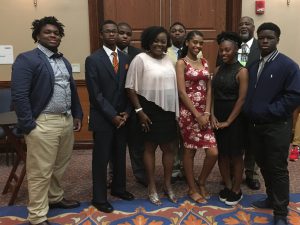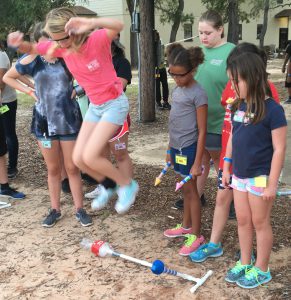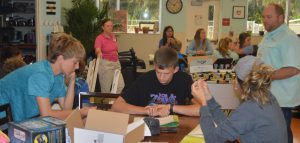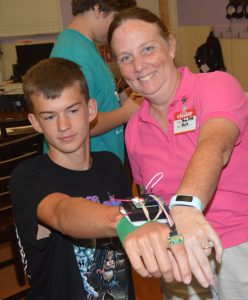by Taylor Wilken | Feb 1, 2019
 Last year, 520 youth and 170 adults from 34 Florida counties told the 4-H story filling the state capitol with 4-H advocates. Youth educated their representatives, senators, and legislative aides on how 4-H has made an impact in their lives while experiencing the political processes of state government.
Last year, 520 youth and 170 adults from 34 Florida counties told the 4-H story filling the state capitol with 4-H advocates. Youth educated their representatives, senators, and legislative aides on how 4-H has made an impact in their lives while experiencing the political processes of state government.
A sea of green will flood the Florida’s state capitol Thursday, April 4, 2019, as Florida 4-H members, faculty, volunteers, and families participate in the annual 4-H Day at the Capitol event.

2018 attendees on the steps of Florida’s historic capitol building.
4-H Day at the Capitol
- Who: All 4-H Members, Friends, Family and Alumni
- When: April 4, 2019
- Where: Tallahassee, FL
- Cost: $15 (includes lunch and a 4-H polo)
- Registration: February 1-28, 2019 in 4-H Online
Schedule
- 7:30-8:15am – Check-in
- 8:30am – Opening Assembly
- 9:00am – Group Photo
- 9:15am – Meetings with Representatives and Senators begins
- 12:00-1:00pm – Lunch Available for Pick-up (Chik-Fil-A)
- 1:00-1:30pm – Closing Assembly
Each county is encouraged to make appointments with senators and representatives and should schedule their day how it best suits the group. For detailed information on the schedule and to prepare for the event, be sure to read the The 4-H Day at the Capitol Guidebook.
Places to Visit/Things to do
Close to the Capitol, you’ll find several things to do to fill in the rest of your day.
- Governor’s Mansion
- Knott House
- Riley House and Museum
- 4-H Day at the Capitol Scavenger Hunt
- Florida Historic Capitol Museum
- Museum of Florida History
- Big Bend Farm
- For more information, check out Explore Tallahassee
Resources
For more information on 4-H Day at the Capitol or 4-H in your county, contact your local UF/IFAS County Extension Office.
by Melanie Taylor | Jan 11, 2019

Be mindful and enjoy the moment.
Now that the busy holiday season is over, it’s a time to reflect on the past but prepare and refocus for the new year ahead. As we focus on the new year, it is always refreshing to have a clean slate. As the year begins to unfold, there are tips to help you manage your day-to-day stress levels. It begins with mindfulness.
What is mindfulness?
Mindfulness means paying attention in a particular way; on purpose, in the present moment, and non-judgmentally.” Dr. Jon Kabat-Zinn (1991)
Mindfulness is best thought of as a way of being rather than an activity Almost any activity can be carried out with mindful awareness.
Three Key Features of Mindful Awareness:
- Purpose – intentionally and purposefully directing your attention rather than letting it wander.
- Presence – being fully engaged with and attentive to the present moment. Thoughts about the past and future that arise are recognized simply as thoughts occurring in the present.
- Acceptance – being non-judgmental toward whatever arises in the moment. This means that sensations, thoughts, and emotions are not judged as good or bad, pleasant or unpleasant; they are simply noticed as “happening” and observed until they eventually pass (Naik, Harris and Forthun 2016).
Mindfulness is a mind-body practice that has been found to benefit both psychological and physical health. The primary psychological change that occurs during mindfulness practice is an increased awareness of thoughts, feelings, and sensations in the present moment. Over time, mindfulness practice can help you to become aware of the space between noticing experiences and reacting to them by letting you slow down and observe the processes of your mind (Black 2010).
The ultimate goal of mindfulness practice is for you to take advantage of this space so you can make more intentional decisions – to wake up from living life on autopilot, based on unproductive habits of mind
(Black 2010; Walach et al. 2007).
According to the American Psychological Association, some empirically supported benefits of mindfulness include the following (Davis & Hayes 2011):
Psychological Benefits
- Increased awareness of one’s mind
- Significantly reduced stress, anxiety, and negative emotions
- Increased control over ruminative thinking (a major cause and symptom of depression and anxiety)
- Increased mental flexibility and focus
- More working memory
- Decreased distracting thoughts
- Decreased emotional reactivity
- Increased capacity for intentional, responsive behaviors
- Increased empathy, compassion and conscientiousness of other’s emotions
Physiological Benefits
- Enhanced immune system functioning
- Increased brain density and neural integration in areas responsible for positive emotions, self-regulation, and long-term planning
- Lowered blood pressure
- Lowered levels of blood cortisol (a major stress hormone)
- Greater resistance to stress-related illnesses such as heart disease
Spiritual Benefits
- Increased self-insight and self-acceptance
- Increased acceptance of others
- Increased compassion and empathy
- Increased sense of morality, intuition, and courage to change
- Increased control over automatic behaviors
- Increased self-discipline
The question is, how many of us would like to benefit from mindfulness if it provides these positive benefits? All of us should strive to lower our stress level and enjoy our daily lives with a more positive attitude and more attentiveness. So, how can we incorporate this into our lives? The majority of this practice is about familiarizing yourself with what it feels like to be mindful, and getting better at “remembering” to maintain mindful awareness.
Experiment with creating your own mindfulness practices throughout your day. Being mindful of the sensation on the soles of your feet as you walk to your car or the taste and texture of your morning coffee can transform routine moments into deeply satisfying practices. However, having a ritualized and structured practice can be beneficial. To find out more about practicing mindfulness and how to incorporate a more structured practice in your life visit read Mindfulness: An Introduction.
Sources: Mindfulness: An Introduction. 2013, 2016. Retrieved from the UF/IFAS Extension Electronic Data Information System: https://edis.ifas.ufl.edu/fy1381. Publication #FCS2335
by Yolanda Goode | Sep 14, 2018

Gadsden County 4-H youth on campus for 4-H University. 4-HU is the premier youth leadership development event of Florida 4-H.
Leaders – Born or Made?
Many of us have heard the saying, “oh, that young man or woman is such a natural born leader.” But are leaders born that way, or do they develop into leaders? These Gadsden County delegates took advantage of 4-H University this summer – an awesome Florida 4-H state event designed to grow leadership skills. Many of them have also served as volunteer 4-H camp counselors during the summer. They understand that leaders are developed and not born.
What Defines a Leader?
Sometimes people confuse charisma with leadership abilities. Charisma is a special magnetic charm or appeal (Merriam-Webster Dictionary). Many of our local to national leaders have some level of charisma. In addition to charisma, leaders should have the more important skills such as communication, problem solving, critical thinking, managing, and self-awareness. There are many definitions for leadership because there is no universal definition. Leadership involves a process while a leader is the one who carries out the process.
How Does 4-H Unlock Your Leadership Potential?
One of my favorite teaching tools used to develop my Gadsden County 4-H leaders is the “Unlock Your Leadership Potential” by UF/IFAS Extension. It has influenced how I would define a leader. The overall goal of a good leader is to move the group or organization toward its goals while building a sense of togetherness and well-being.
Florida 4-H grows leaders at the club, county, district, and state levels by creating safe and nurturing environments and providing quality experiences. Knowledge and skills are great, but being able to apply them through experience is what fortifies and matures youth as well as increases their confidence. The 4-H slogan, “Learn by Doing”, is why the 4-H Experiential model is important to UF/IFAS-Extension 4-H Youth Development Program. The more active the youth and the duration of a their engagements in 4-H positive youth development the greater the benefits not just for them but also their communities (2013, National 4-H Council). It takes a whole team of Extension professionals, staff, 4-H Seniors, and volunteers to make the “magic” happen.
Call to Action:
- Begin the journey as a youth or volunteer: http://florida4h.org/getinvolved/
- Engage in local and state 4-H programs: http://florida4h.org/programsandevents_/
- Give to Florida 4-H: https://www.uff.ufl.edu/give-now/?fund_id=003603
- Read and share the other great blogs by my colleagues here: https://nwdistrict.ifas.ufl.edu/4hn/
- Join the “30 Days of Doing” 4-H Movement: https://4-h.org/inspire-kids-to-do/
References and Further Reading:
by Melanie Taylor | Jun 8, 2018

Gulf and Franklin County campers shooting rockets at Camp Timpoochee in June 2017.
As the school year wraps up, you’re likely trying to fill up your child’s summer with fun and educational programs. Fortunately, you’ll find a variety of day and residential summer camps out there. Does the thought of sending your child to camp cause anxiety for your or your child? If so, let’ me give you some tips to eliminate those concerns.
First, summer day camps and residential camps can be some of the most memorable events in a child’s life. Some children make memories and friends that last a lifetime. But as a parent, you need to feel comfortable about the camp you send your child to.
When starting the camp selection process, begin with your child’s interests. Make sure you know the camp will provide activities that will enhance your child’s personality and maturity level. Including your child in the process will help them feel more secure and excited about what camp will offer them. This will also help get rid of some of their anxiety because they’ll know what to expect (especially if they have never attended camp before).
Here are questions recommended by the American Camping Association (ACA) to help you make the best summer camp decision.
Questions to Consider in Selecting a Residential Camp:
- What locale do I want to consider? (mountains, oceanfront, distance from home, etc)
- Do I want a traditional camp that gives my child a wide variety of experiences, or do I want to select a specialty camp that focuses on a particular activity or set of skills?
- What size enrollment will make my child feel comfortable?
- How rustic do I want the camp to be?
- How structured do I want the program to be? Does my child like to have lots of choice in the activity schedule?
- Is my child ready to sleep away from home for an extended stay? (This will help you to select either a resident or day camp setting.)
- What session length will appeal to my child and to our family plans for the summer? (One week? Eight weeks? Length of day?)
- How can I stay in touch with my child during camp? Does the camp allow mail, phone calls or e-mail? Does the camp have parent visitation days?
- How will the camp meet my child’s special dietary or physical needs?
- What is my budget for camp tuition? (Remember, many camps offer financial aid.)
Questions to Consider in Selecting a Day Camp:
Day camps offer experiences unique from residential camps. Because of this, there are specific points to consider when choosing a day camp – transportation, overnights, swimming lessons, food service, horseback riding, group pictures, t-shirts, extended care, field trips, etc.
- Does the American Camp Association accredit the camp? (ACA has specific standards applicable only for day camps.)
- What training does the staff receive on safety, supervision, counseling, problem solving and other issues unique to working with young children?
- Is the price all-inclusive or are there extra charges?
- If transportation is offered, where is the closest pick-up location?
- Does the camp have an “express bus” which transports children quickly?
- If before and after-camp extended care is offered, who is with the children and what activities take place?
- Is lunch served, or do campers bring their own sack lunch? Are snacks and drinks provided?
- If the camp offers swimming, are there swimming lessons, or is it simply recreational swimming?
- Are campers in a group with a counselor all day? Or, are campers free to go from one activity to another with appropriate supervision? In this case, who would you talk to if you had a question or concern about your child?
- Is an open house offered before camp starts where you can meet your child’s counselor and van/bus driver?
- Are parents allowed to drop by for visits or is there a special parent visitation day?
Along with the above questions, you should also know that in the state of Florida, summer camps are not inspected or regulated by the Department of Children and Families (DCF). This makes it even more important for parents to gather information about the quality and safety of the program on their own. Parents should check to see if they are welcome to visit and observe the camp in action or attend activities with their child at any given time including water activities.
DCF suggests you ask these questions:
- What the programs health, safety and nutrition policies and procedures?
- Is the staff screened?
- What are the staff/child ratios and group sizes of the program?
- Is the staff well-trained?
- Is the program licensed or accredited?
- Are parents welcome to visit? Are family activities offered?
- Is there a daily lesson plan?
- Is the facility adequate for the number of children enrolled?
- What are the hours of operation, fees and payment procedures?
Download the Selecting Summer Care for School-Age Children: A Quality Checklist at http://www.dcf.state.fl.us/programs/childcare/docs/SummerChecklist.pdf.
Because you should know – Florida law does require summer camps to conduct background screenings of all camp personnel, including owners, operators, employees and volunteers. Volunteers providing less than 10 hours of service per month do not need to be screened as long as they are always within sight of a person who meets the screening requirement. In the state of Florida, the camps supported by UF/IFAS Extension meet each of the standards above.
The above questions and items to consider should help you in the camp selection process. Always feel confident in asking any questions – as the parent, you have the right to feel confident in your child’s camp selection.
As you begin your summer camp search, remember to check out the day and residential camping programs offered by your local 4-H program. We are confident in our volunteers and staff competency and would love to have your child participate in our safe and fun-filled summer camps. Contact your local Extension Office for more details.
Resources for this article may be found at: www.acacamps.org and www.myflfamilies.com.
by pmdavis | Oct 4, 2017
As part of National 4-H W eek, 4-H’ers participate in 4 H National Youth Science Day (NYSD), the world’s largest youth-led science experiment. This year’s 4 H NYSD event will take place on October 4. The 2017 4‑H National Youth Science Day Challenge is called Incredible Wearables! This year’s challenge was developed by University of Nebraska-Lincoln and incorporates the fast-evolving field of wearable technology, teaching kids to not only use technology but to create it and understand how it works.
eek, 4-H’ers participate in 4 H National Youth Science Day (NYSD), the world’s largest youth-led science experiment. This year’s 4 H NYSD event will take place on October 4. The 2017 4‑H National Youth Science Day Challenge is called Incredible Wearables! This year’s challenge was developed by University of Nebraska-Lincoln and incorporates the fast-evolving field of wearable technology, teaching kids to not only use technology but to create it and understand how it works.
From watches and eyewear to fashion and virtual reality headsets, wearable technologies are fast becoming the must-have accessory for forward-thinking people around the world. Wearable technologies didn’t start out as trendy however – one of the world’s first wearable technologies was the hearing aid! Wearable technologies are now used in industries around the globe, from education and sports, to health, fashion, entertainment, transportation and communication. In this year’s challenge, youth use the engineering design process to build a prototype wearable technology that will gather data to help solve a real-world problem. They will design and build their own low-cost wearable health monitor following the engineering design process. This process includes defining the problem, designing and building prototypes (solutions) then systematically testing and evaluating enabling them to redesign for optimization of wearability and functionality.
During the innovative, hands-on project, these future engineers must work together to design, build and refine a wearable health-tracking device that is easy-to-use and aesthetically appealing. In fact, youth from Bay County have been training with their adult leaders to teach this challenge to other youth in their community on National Youth Science Day. Jason Scott, from Scott Innovative Solutions and an engineer at NSA PC, teamed up with the Bay County 4-H Agent to teach youth and adult partner teams about this project enabling them to be able to share their knowledge with others on October 4. When participants will attempt to solve the problem of people not staying active enough to lead healthy lives. In fact, youth will build a prototype fitness tracking device that could ultimately be marketed and sold to consumers to positively affect fitness behaviors.
After completing the challenge youth will have had an experience of using the engineering design process to build a device to help them monitor their health so they can gather data to make better decisions. They will understand more about how wearable technologies like FitBits, Smartwatches and other wearable devices are made.
The field of wearable technologies continues to grow in both quantity and quality. New technologies are being developed and put on the market on a regular basis, including virtual reality and augmented reality devices, clothing and accessories, as well as health monitoring devices. The future of wearable technologies is limited only by the imaginations of those designing them. By studying STEM and participating in this National Youth Science Day Experiment, youth could use technologies to develop products and mechanisms we haven’t even thought of, but definitely desire! To find out more information about other 4-H programs like this or volunteer your time to work with youth, contact your local UF IFAS County Extension Office or visit http://florida4h.org.

Comparing device to prototype
 Last year, 520 youth and 170 adults from 34 Florida counties told the 4-H story filling the state capitol with 4-H advocates. Youth educated their representatives, senators, and legislative aides on how 4-H has made an impact in their lives while experiencing the political processes of state government.
Last year, 520 youth and 170 adults from 34 Florida counties told the 4-H story filling the state capitol with 4-H advocates. Youth educated their representatives, senators, and legislative aides on how 4-H has made an impact in their lives while experiencing the political processes of state government.





